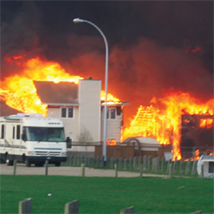In the early morning hours of May 15, 2011, as the fires raged through the town of Slave Lake,  Alberta, no one could have predicted the devastation and destruction those flames would leave behind. Nor could they have foreseen the overwhelming strength of human spirit that would rise up in support during those darkest of hours.
Alberta, no one could have predicted the devastation and destruction those flames would leave behind. Nor could they have foreseen the overwhelming strength of human spirit that would rise up in support during those darkest of hours.
In the days that followed, residents of over 400 homes were being relocated to the care of friends, relatives and even strangers to remedy their sudden homelessness. The surrounding cities of Westlock, Athabasca and Edmonton were flooded with victims, all seeking shelter. School gyms and community halls were used as bunkers, hotels opened their doors free of charge and surrounding communities began to ship food, clothing and various other necessities as early as the morning of May 16.
"The support was amazing," says Tara Villeneuve (Fashion Design and Merchandising ‘07). "You can't really describe it. It's like, we've never met, we will probably never meet, and they still want to give to us."
While she resided in Calgary at the time of the fire, her parents were among the over 700 residents who lost their homes during those fateful days. Those who had no homes to return to after the evacuation call was lifted were forced to search for alternate options.
"Most people depended on relatives nearby," says Villeneuve, describing how her parents had found shelter with family in Edmonton as they waited for permission to re-enter their town. It was over a week before the crews had cleared away enough of the destruction to allow residents to begin filtering back into town.
When Villeneuve's parents returned, immediate accommodations were established for them by the town officials. Because of her mother's job at the local college, the resident housing was opened up to them without question.
"They were set up in a hotel for about a week," says Villeneuve, "and then moved to the college, where my mom works, after that."
During the week of clean-up, crews worked tirelessly to remove debris, creating safe spaces for the remaining residents and providing aid to the town in any way possible. Despite their continuing efforts, the devastation was too much to bear for some residents and they could not face returning and rebuilding the lives they had lost.
"Many people chose to leave," says Villeneuve. "There were a few families who had just moved there and they had no ties. I think it's a lot different for us. It's the kind of place that you grow up in and you don't really leave. There are generations of families there."
According to Kara Sinclair, a 2010 graduate of Multimedia Production whose home survived the disaster, the sight of the fire-ravaged parts of town is almost unbearable. "It's weird seeing it now," she says. "It's like, that's my town. It would be like driving from Lethbridge College to the west side and having it be completely destroyed."
Sinclair, along with members of her family, braved the fires in an attempt to document the disaster with video footage, hoping they could bring the severity of the fires to the public eye. With the help of friends and family, Sinclair is now selling copies of the DVD to raise funds and awareness for the continuing and extensive rebuilding process, which could take years to complete.
The response to her efforts has been positive and enlightening for those affected and those in surrounding areas. "You see the pictures in the paper," says Sinclair, "but you don't get the full impact until you see it in real life."
Despite the rise in support for those affected, some funding may be running out for the residents left in temporary housing. "Everyone was treated equally in the beginning," says Sinclair, "but it was just in a different way. Now, the people who lost their homes are just waiting on the builders to decide what to do." For a close friend, the comforts of home are severely lacking.
"It's hard for them," Sinclair describes of her friend's situation. "They were used to going home and relaxing, but now the only place they have is a hotel room. I have a hard time seeing them like that."
Modular homes are in demand by the town to provide more long-term living solutions for those who have been displaced, though they are not expected to be available until late this year. The entire process of rebuilding the southeast neighbourhood destroyed by the fires is expected to take at least two years to complete.
For Sinclair, the reality of what her friends and neighbours are struggling through brings a deep sense of gratitude. "Everyone is so positive and focused on rebuilding," she says. "I feel pretty lucky."
For more information on how to donate to the Slave Lake disaster, you can contact the Canadian Red Cross at 1-800-565-4483 or go to www.redcross.ca.


